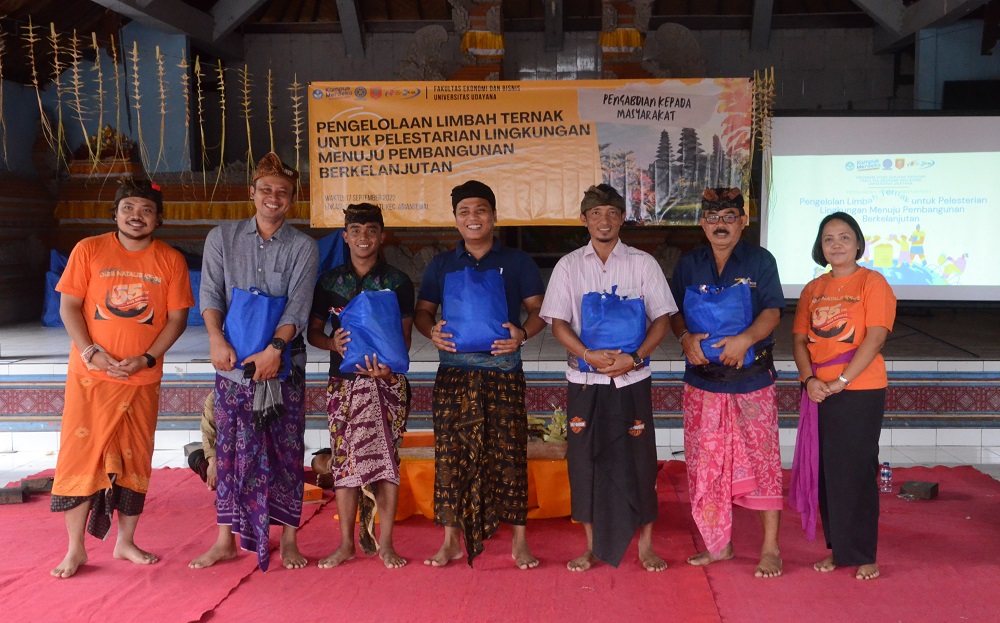Community Service Program FEB UNUD Bachelor of Economics Program Holds Community Service Livestock Waste Management for Environmental Sustainability Towards Sustainable Economic Development.
The Bachelor of Economics Study Program, Faculty of Economics and Business, Udayana University held a Community Service Program on Saturday, September 17, 2022, at Bale Banjar Jaba Jero, Jagapati Village, Abiansemal District, Badung Regency, Bali with the theme Livestock Waste Management for Environmental Sustainability Towards Sustainable Economic Development.

This Community Service (PKM) is one of the obligations of the Tridharma of Higher Education in addition to the obligations of Education and Research. Community service is an activity of the academic community in utilizing science and technology to advance the welfare of the community and educate the nation's life.
Jagapati Village is one of the villages in Abiansemal District, Badung Regency, Bali Province, where most of the population has a livelihood as pig farmers. The number of pig farmers in this village reaches hundreds of pig farmers and until now pig waste in the form of manure from pigs is still not managed properly, causing air pollution to pollute water. Waste generated from livestock activities has the potential to be developed into a variety of useful and economically valuable products.
With the potential and availability of raw materials, waste management is deemed necessary to increase production capacity and the environment around the communal cage, which can later become a source of income for farmers in Jagapati Village. In addition, it is deemed necessary to expand the scale of business, so as to obtain economic benefits. For that we need a knowledge related to the development of business scale with access to financial institutions to obtain liquidity. Providing information to access financial institutions is deemed necessary for business actors, especially pig farms. Therefore, it is necessary to have a vehicle to bridge the need for such access, especially to residents of Jagapati Village in general, and to pig farmers in particular to manage pig waste, so that it is hoped that the waste will not cause environmental pollution, but is able to provide economic value added. and information related to access to business credit for the people of Jagapati Village, Abiansemal District, Badung Regency.

The Community Service activity was opened directly by the Coordinator of the Bachelor of Economics Study Program, FEB Unud, attended by the Jagapati Village Headmaster and all government elements from both the Service Village and the Traditional Village. This service involves participants who are elements of the local community, the majority of whom make a living as pig farmers and were also attended by Lecturers of the Economics Study Program, FEB Unud. This Community Service Program presented three speakers, namely: 1) I Ketut Widiana Karya, SE., MBA (President Director of PT Jamkrida Bali Mandara), 2) Putu Angga Primadana, SM (Practitioner and cultivator of Magot) and 3) Prof. Dr. Made Suyana Utama, SE., MS (Professor of FEB Unud), in addition to the 3 (three) resource persons, there will also be a sharing session from one of the farmers in Jagapati Village who has cultivated pig waste, namely I Made Agus Angga Mahardika, S.Pt.

Through this Community Service Activity, it is expected to be able to:
1) increase knowledge and add insight to the target community,
2) assisting the target community to solve problems in the field of the environment and sustainable economy, namely through the management of pig waste,
3) encourage the target community to be able to increase awareness of the sustainability of the surrounding natural environment and
4) open knowledge and access to liquidity for the development of community business scale.
At the end of the event, the provision of basic necessities was carried out for the community in the Jagapati Village environment.





